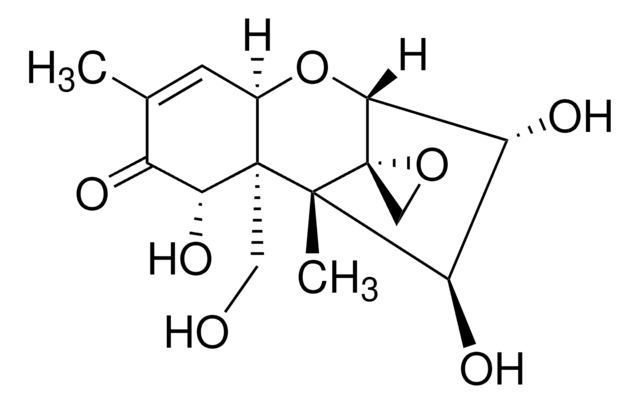IRMM316
Nivalenol in acetonitrile
IRMM®, certified reference material
Sinónimos:
Nivalenol solution, 3α,4β,7α, 15-Tetrahydroxy-12,13-epoxytrichothec-9-en-8-one, NIV
About This Item
Productos recomendados
grade
certified reference material
agency
IRMM®
manufacturer/tradename
JRC
application(s)
general analytical
format
matrix material
SMILES string
[H][C@]12O[C@]3([H])[C@H](O)[C@@H](O)[C@@](C)([C@]34CO4)[C@@]1(CO)[C@H](O)C(=O)C(C)=C2
InChI
1S/C15H20O7/c1-6-3-7-14(4-16,11(20)8(6)17)13(2)10(19)9(18)12(22-7)15(13)5-21-15/h3,7,9-12,16,18-20H,4-5H2,1-2H3/t7-,9-,10-,11-,12-,13-,14-,15+/m1/s1
InChI key
UKOTXHQERFPCBU-XBXCNEFVSA-N
¿Está buscando productos similares? Visita Guía de comparación de productos
Analysis Note
IRMM316
Legal Information
signalword
Danger
Hazard Classifications
Acute Tox. 4 Dermal - Acute Tox. 4 Inhalation - Acute Tox. 4 Oral - Eye Irrit. 2 - Flam. Liq. 2
Storage Class
3 - Flammable liquids
wgk_germany
WGK 2
flash_point_f
35.6 °F - closed cup
flash_point_c
2.0 °C - closed cup
Elija entre una de las versiones más recientes:
Certificados de análisis (COA)
Lo sentimos, en este momento no disponemos de COAs para este producto en línea.
Si necesita más asistencia, póngase en contacto con Atención al cliente
¿Ya tiene este producto?
Encuentre la documentación para los productos que ha comprado recientemente en la Biblioteca de documentos.
Nuestro equipo de científicos tiene experiencia en todas las áreas de investigación: Ciencias de la vida, Ciencia de los materiales, Síntesis química, Cromatografía, Analítica y muchas otras.
Póngase en contacto con el Servicio técnico







